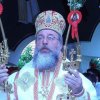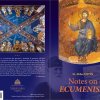Greeting from His Grace Bishop Maxim of Los Angeles and Western America
Oakland 90th Anniversary Greeting 2016
Dear Brothers and Sisters, our beloved Children in the Lord,
This anniversary in Oakland coincides with the recent canonization of Archimandrite Sebastian (Dabovich) of San Francisco and Jackson, clergyman and preacher of the Gospel who inspired many missionaries. Once again, through the life of this Saint, we see a faith that produces holy persons, enriches the world with saints and insists on an ethos of holiness.
Living in the Bay area, you might better understand how the life of the Church has the depth and breadth of the open ocean, such that great swells do not make the waters turbid, but release the “ozone” of health and courage which strengthens man in his struggle. When you live in the world that they have shaped and partake in the universal concelebration of heaven and earth which is celebrated in the Orthodox Church, you pulse with a vibration that reveals to you things unseen.
Many times Orthodox immigrants have gone to other countries and not lost our faith and our character, but have often rediscovered and lived them better. Our Orthodox manners and customs are liturgical, and our upbringing, ethos, and education are those of the Church. The axis of our tradition and our life is the God-man. The whole parish is one family, one Church. Its feast and festivals, the feasts of the Church. And the church feasts are the days for its holidays, festivities and songs. The folk songs, their words and their music, are related to the music (and the ethos) of the Church.
In most cases, Church life in this part of the Serbian Church during the Great Depression survived, its organization preserved at both the diocesan and congregational level. There was even the case of Akron where people, though suffering hardship and destitution during the Depression, through the efforts of their priest Milan Popovic, built a new church dedicated to St. Demetrius. During this period of adversity our people united around their Church, which had also become impoverished, since it was the only place they could turn to and share what little they had in those sad times.
May this Jubilee which we commemorate in Oakland as well as the Commemorative Book marking the ninetieth anniversary of the establishment of the Serbian Orthodox Parish of Saint George, remind us all of the zeal of our ancestors and guide us to the sacred goal of unity in Christ and His Orthodox Church.




